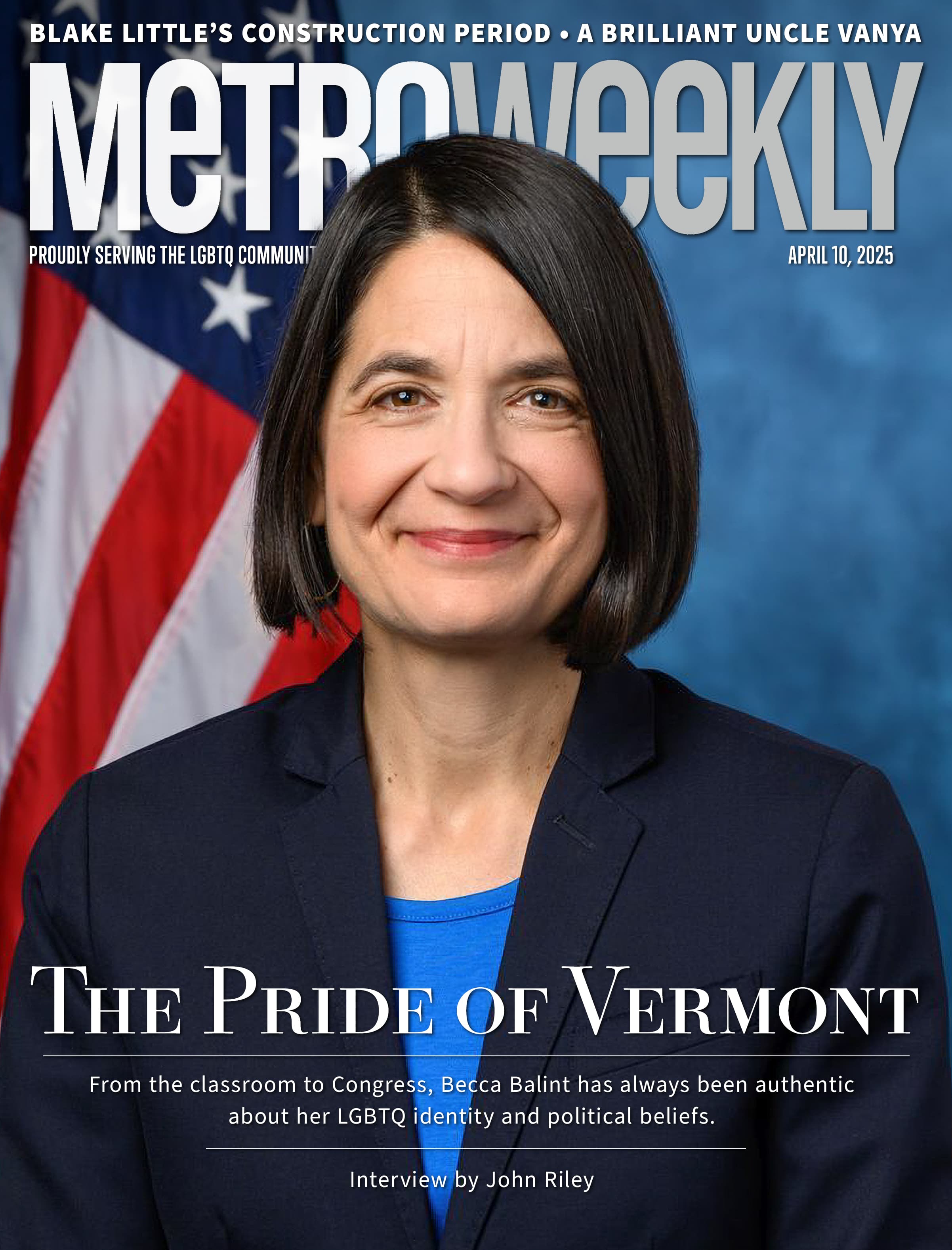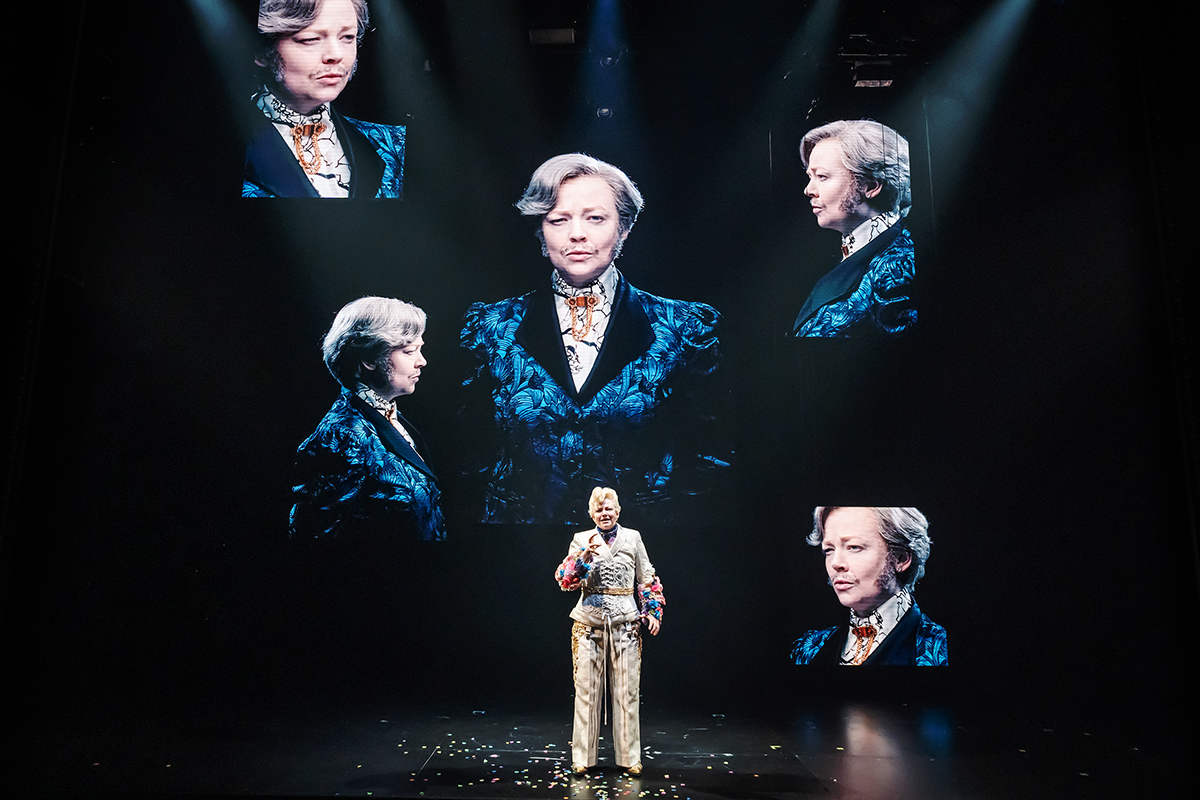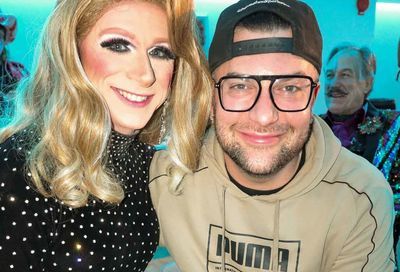The Immortalist: A Conversation with André De Shields
At 78, André De Shields is an everlasting legend in the world of Broadway. But his ultimate goal is to break the Methuselah Code.

“Are you Bette Midler’s best friend?”
People have been asking André De Shields questions to that effect a lot lately. Blame the internet. “Someone was digging through material, discovered that piece of information and put it on the internet,” the actor says. The biographical entries about the actor on both Wikipedia and the Internet Broadway Database now include a line about his work for Midler — dating to nearly 50 years ago.
As it turns out, De Shields helped Midler choreograph two of the pop diva’s earliest concerts in the mid-1970s, including her famed Broadway spectacle Clams on the Half Shell Revue. Specifically, he was hired “to choreograph what she called her girls, the trio of women who sang behind her,” he says. “That’s essentially the story.”
In the decades since, De Shields’ career has flourished in its own right, and he’s become increasingly venerated for his work and talent. In fact, Midler added her voice to those singing De Shields’ praises last year when she submitted a video shown as part of a tribute show organized by New York’s Gay Men’s Health Crisis.
“No, I’m not her best friend,” De Shields says. “We worked together, and she became the Divine Miss M, and I became [a] Broadway deity.” Playful pomposity aside, De Shields, who turned 78 earlier this month, is revered as an elder statesman and a living legend of Broadway. His credits include starring in the original productions of The Wiz, The Full Monty, and Hadestown, the latter of which earned him both a Tony Award and a Grammy Award. Decades earlier, he won an Emmy for a televised version of Ain’t Misbehavin’, another musical he also starred in on Broadway.
“You can’t define Broadway without André De Shields,” says Luke Frazier of the American Pops Orchestra. “When you look at André’s journey, both on Broadway and as an icon of the history and struggle of progress, this man has been a pillar of the community for so many years, and a source of strength and inspiration.”
Frazier first worked with De Shields when he featured the performer in True Colors: LGBTQ+ Our Stories, Our Songs, the APO special celebrating the LGBTQ community that aired on PBS in 2022.
As one of “Broadway’s Leading Men,” De Shields returns for the orchestra’s first concert of 2024, which bears that thematic title. The focus, says Frazier, is on “men who have changed [and] are changing the history of Broadway.” Joining De Shields is an illustrious lineup that includes Norm Lewis, Christian Borle, Telly Leung, Matthew Morrison, Christopher Jackson, and Alexis Michelle.
Frazier collaborated with all the performers to develop a diverse setlist of songs telling “a broad story of Broadway — not only the history, but where we’re going.” He further calls it a “trademark APO mix of things you would expect them to sing and things they have never performed publicly, or very rarely sing.”
The concert will be performed before a live audience on Saturday, Feb. 3, at Howard University’s Cramton Auditorium. A version of the show will subsequently air on PBS later this year, at a date still to be determined.
For his part, De Shields is expected to perform two songs, including a signature number from The Wiz and a wild card styled in what Frazier refers to as a Victor/Victoria kind of twist. “It’s a song from a Broadway show made famous by a female singer that we have moved to a male key,” he teases. “It’s something that is really all about showing André’s artistry and how he can really captivate you.”

METRO WEEKLY: The upcoming American Pops Orchestra concert will bring you back down to D.C., putting you tantalizingly close to your hometown of Baltimore. Do you make it back often? Do you still have family there?
ANDRÉ DE SHIELDS: Today I only have one sibling left [down from 10 originally]. John, the fifth-eldest child. He’s 84. He’s in Baltimore. And I am going to see him when I come to Washington. I will come back to New York from Baltimore.
And I was there in September, because the street on which I grew up was renamed André De Shields Way.
MW: That must have been a trip. How did that make you feel?
DE SHIELDS: Like I’m going to live forever, which is one of my missions. Not so much forever, but I want to break the Methuselah Code. Methuselah is the oldest living person in history. He lived for 969 years, which is a lovely palindrome. I figure I’ve got to make it to 970 years.
MW: You’re not even a fraction of the way there yet.
DE SHIELDS: Well, I turned 78, so I’m getting there. So in 22 years, I will have lived an entire century. I’m working on it. I am an immortalist.
MW: How did you find it to be, growing up in Baltimore?
DE SHIELDS: It was in the ’50s, ’60s, my formative years, and the classic illustration of an inner city. It’s rough, it’s hard, it’s difficult. We are in a neighborhood of working-class families. Bethlehem Steel used to be the largest employer in Baltimore, and many in my neighborhood worked at Bethlehem Steel, including a brother of mine.
We didn’t have much of anything, but I didn’t know that we were impoverished until I left the neighborhood. And instead of presuming that everyone lived the way that we did, I discovered that, no, that’s not the truth. Some people have means by which to not only survive in this so-called American Dream, but to thrive and ultimately prevail.
We were a large family — I was number nine of 11 — so a little had to go a long way. And I am what would’ve been called then a “race man.” We were always encouraged that when away from home, everything we did, everything we said, how we presented ourselves to the world, represented the entire race. That sounds a little corny these days when there’s so much individuation and the politics of authenticity, [and when] communities are diminishing.
I’m sure you know the song “New York, New York” — “If you can make it there, you can make it anywhere.” Well, in many ways I have made it in New York, but I could not have made it in New York if I hadn’t first made it in Baltimore. The test of growing up against what seemed then like insurmountable odds — and learning not to ask God to move the mountain, but to find your way around it. And that’s how I continue to live my life.
MW: Did you grow up acting, singing, and wanting to be on stage?
DE SHIELDS: I was not exposed to the arts as a young man, but I knew that my destiny, if you will, would be on the world stage. “The whole world’s a stage and each one of us is an actor upon it.” Shakespeare said that, but it’s true. And instead of having to find what mask I’m going to wear to get around a 24-hour day of drudgery, I now change my mask in terms of how I’m going to serve the people I’m going to meet.
I do believe in empathy, compassion, and beneficence as the way to lead one’s life. When times get hard, I do something for someone other than myself.

MW: What was the coming out process like for you?
DE SHIELDS: It didn’t exist. It didn’t exist. When you grow up with 10 siblings, there are no secrets. Whenever I hear parents say, “Oh, I didn’t know. I had no idea.” No, you knew, you had an idea, but you wouldn’t allow yourself to, one, embrace it, and two, believe it. So this whole concept of having to come out — I want to flip that script. Why don’t the people who other us come the fuck out? You know what I mean?
We’re the ones who have to find out, “Oh, you’re my mother and you hate me? Oh, you’re my brother, and you think I’m a faggot? Oh, you’re my sister, and you think I’m the scum of the earth?” No, they got that backward.
At any rate, I didn’t have to come out to my family because they knew André. As a young man, I had girlfriends. They embraced my girlfriends. As an older person, I had boyfriends. They embraced my boyfriends.
This idea of coming out — Why do we put that burden on an individual? Why not accept the person as he or she is? That’s what we have to learn. It’s smart and also empathic.
MW: How do we do that? How do we learn that?
DE SHIELDS: Well, there will be another pandemic — and there will be pandemics until we learn it. Which is why I don’t — I won’t say I don’t understand, because I do understand, but I am amazed that we were stymied during the Covid pandemic. Those of us who had been othered for all these years weren’t. We went through this. We know what this is, and we knew how to get on the other side of it: Be kind to people, ask them what they need, help one another — take care of yourself, and then take care of someone else.
MW: People didn’t learn that.
DE SHIELDS: No, no. It was used as another tool to separate us, to polarize us. Us meaning all humanity.
And now, we’re dealing with what we call climate change, and we think it is our opportunity and that we have the ability to save the planet. The planet doesn’t need us to save it. The planet can take care of itself. The message is, “Humankind, wake the fuck up. Stop destroying one another. Start embracing one another. Stop making these foolish judgments by the amount of melanin that is or isn’t in a person’s skin.”

MW: We also need to stop destroying the planet.
DE SHIELDS: I’m saying if we don’t realize that we are the virus, we can’t do anything to help the earth. We have to first understand that we are the problem. We are the disease. We are the pandemic.
MW: How do we do that? How do we knock some sense into people?
DE SHIELDS: Well, first of all, get rid of this concept that you can knock sense into anybody. No, seriously, seriously, because our solution for everything is, “Kill it.” That isn’t how we became what Shakespeare calls the paragon of animals. That’s not what evolution is.
MW: It’s the opposite.
DE SHIELDS: Exactly. Let it live. Let it thrive. Everything is beautiful. You know what I learned when I was working in France? France is known for many things — champagne, the Bay of Biscay — but also for enormous fields of sunflowers. Tall, giant sunflowers. There are few things as beautiful as a field of sunflowers. They move. They have a life of their own. They’re sentient, and it’s sometimes hypnotic, but the point I’m making is this: In a field of sunflowers, a rose is a weed.
And that’s exactly how we look at it. If there’s one exception to the monolith of anything, we want to kill it. That’s what you do with weeds.
Now, there’s something that is changing. People are now allowing their lawns to grow into the wildflowers that are indigenous to the soil that they grow in. Let’s stop — oh Lord! — let’s stop with these power mowers and the leaf blowers. There is a naturally intelligent reason why leaves fall from trees. You don’t have to blow them away and turn them into mulch. Leave them there and they will mulch themselves. “But oh no, I can’t have a dandelion in my lawn. The grass can only be five centimeters high.” But now people are learning: Let it be.
We have to rape the earth, take everything out of it — gold, diamonds, oil, fossils. The Earth is a sentient being just like we are. Why is that so hard to understand?
MW: Switching gears to your career, a major highlight came just a few years ago, when you won the 2019 Tony Award for your role in Hadestown as Hermes. Your acceptance speech also stands as a highlight as one of the most memorable, insightful, and succinct of them all. What inspired you to share, then and there, what you refer to as “your three cardinal rules of sustainability and longevity?”
DE SHIELDS: Hadestown was my third nomination. We say number three is the charm. And the universe loves trinities, things that happen in threes or multiples of threes. So I had a feeling, an emotion, a tingle in my spine that this might be my turn.
I had spent 55 years as a performing artist, and I had achieved personal goals, and I felt successful in terms of what I wanted to do and what I was achieving. But I hadn’t received the objective accolades that let you know that you have made a difference. So I didn’t receive my Tony until I was 73, which in terms of how this game works, is late — but that isn’t the way I looked at it. I knew it was right on time.
Service is what I do as an actor, as an activist, as a storyteller, as a griot. I certainly disagree with all the many people who complain that life is short. I don’t believe that life is short. Of course, depending on how you live your life, it can be diminished, but life is long and ever-changing, and that’s what I want to embrace from day to day. It doesn’t mean that I don’t get down, it doesn’t mean that I don’t get stressed out, it doesn’t mean that I don’t get depressed every once in a while. But my insight is farsighted.
When one gets a Tony nomination, and if you are fortunate enough to win the Tony, you have only 90 seconds for your acceptance speech. And I’ve always wondered, if you have only 90 seconds to deliver your speech, why are you trying to thank 100 people?
I am constantly going through the Rolodex of my mind for the wisdom that life supplies us on a daily basis. And I decided that when the time comes for me to receive my Tony Award, [with] several millions of individuals watching the event, I have to say something that every viewer will receive as universal truth, as if I’m speaking to each one of them. My style is “If I know something, share something.” So what am I going to say in my Tony speech? I’m going to share what I know. And what I know are these three cardinal rules:
Rule number one: “Surround yourself with people whose eyes light up when they see you coming.” Many people have responded to that and have misquoted it to say, “Surround yourself with people whose eyes light up when you come into the room.” [But] if you wait until you are in the room, it’s too late. They have to see you when you are on the horizon and know that something good is on its way.
Rule number two: “Slowly is the fastest way to get to where you want to be.” I am constantly questioned by people, “Mr. De Shields, you walk so slowly.” And I say, “Yes, I’m not in a hurry to get to where I want.” I’m inspired by Nachman of Breslov, the late 18th-century Ukrainian rabbi, who said, “You are wherever your thoughts are. Make sure your thoughts are where you want to be.” So I put that in my aphorism machine and came up with “Slowly is the fastest way to get to where you want to be.”
You can run into many people in New York and they’re in a hurry. And if you were to ask, ‘Where are you going?’ Many times the response would be, “I don’t know, but I have to get there in a hurry.” It’s an old-fashioned thing really, to take time to smell the roses. Take time to consider what you are experiencing and to look at what you are encountering so that you know things are really what they seem. Otherwise, you’re dealing with illusions, especially now in the era of AI, artificial intelligence.
And of course, cardinal rule number three: “The top of one mountain is the bottom of the next — so keep on climbing.” Don’t stop and don’t hurry, and we all think in terms of ascending a mountain, which is correct, but climbing can also be in a downward direction. It’s very philosophical, but the highest point on Earth is Mount Everest, which is [29,031] feet above the crust, and then just next door to it, the Mariana Trench is the lowest point on Earth, and it’s [roughly 35,000] feet down — as it is above so is it below. That’s as if an ice cream cone had been pulled out of the ocean and floated on land, but just turned upside down.
So that’s the way I look at the journey we call life.

MW: What attracted you to the role of Hermes?
DE SHIELDS: As fortunate as I have been in this industry — this is going to sound corny — but I wanted to be appreciated, I wanted to be embraced, I wanted to be cast for my intellect, for my mind, for my literacy. I felt that I was being overlooked beyond my ability to move well and to sing well. Jokingly, I say to folks, “I know you thought I was just another pretty face, but I’ve got a mind.” And that’s what attracted me to Hermes.
Hermes is a god griot. He knows everything about everything, and it is his responsibility to make that a continuum, share it from generation to generation.
Now, it is not a mistake that Hermes, one of the youngest gods of the Olympiads, invented language. When I was a young boy growing up in Baltimore and inspired by Brown v. Board of Education and Thurgood Marshall, I decided — and I mean at a young age — that I was going to master the language of my would-be oppressor so that I would always know what’s being said to me, and more important, what wasn’t being said to me. I wanted the confidence of being able to express whatever was on my mind or on my heart. I still think literacy is the greatest tool in anyone’s toolkit. If you cannot understand or make yourself understood, you’re playing a losing game. So as I experienced different levels of education, I concentrated on English.
Now my first national attention was The Wiz. As gorgeous as that show was, and as successful as it was — seven Tony awards — it is, and I think incorrectly so, investigated only on the level of Dorothy and her three friends. But the pivotal character, the fulcrum of the narrative, is The Wizard. In the film, the wizard [is the] old guy who sells snake oil, who’s a charlatan, but ultimately, gives the secret to each of them of how best to live your life. It’s not through the accumulation of things. It is about becoming the best Dorothy, the best Scarecrow, the best Tin Man, the best Lion that you can be. Now, that’s true in all of the iterations of “The Wonderful Wizard of Oz.” The character of the Wiz, the eponymous character of the show, gets short shrift.
It’s always Dorothy, the Tin Man, the Scarecrow, and the Lion. I understand why, but think of that story without the Wizard. It would be endless! The Wizard is the one who unties the Gordian Knot, who answers the riddle of the Sphinx. But no critic will ever review the show that way.
That was my initial national attention, but still thought to be a flash in the pan. Three years later, I came back with Ain’t Misbehavin’. And then The Full Monty. So the ante goes up each time.
Hadestown [has] a gorgeous libretto, it’s a gorgeous folk opera, a gorgeous inspiration from Greek mythology, rendered relative to the lives we are living now. But if you don’t have a griot to tell the story, it’s not going to work. So I said, “Pick me, pick me,” and they did, and there you go.
MW: Do you know what your next big role will or might be?
DE SHIELDS: If you’re speaking in terms of being in the legitimate theater, no I don’t. If there were a cardinal Rule No. 4, it would be this: “Pursue only those blessings that have your name on it.” So I have work to do, I have service to render while the universe is preparing the next blessing with my name on it.
MW: Well, right now, you’re focused on the 40th anniversary of Haarlem Nocturne, an original musical revue you created and are reprising in late February at New York cabaret venue 54 Below. Tell me more about the show and the anniversary celebration, which also features the show’s original director and cast member Marc Shaiman, known today as the Tony-winning composer and co-writer of Hairspray the Musical.
DE SHIELDS: In 1984, Marc and I, and Scott Wittman, and many other people, were creating material on the Lower East Side [that was] very off-Broadway, very counterculture, very organic. I was inspired to do something with a group of friends that would benefit from who we were as a collective of artists. Marc had not yet reached the pinnacle that he is at now, but he was definitely just as talented. The idea was let’s create this contemporary story about the insurmountable odds that we have experienced in the industry, and let’s create songs about that, and let’s put it on. It was a very intimate space. It only sat about 60, maybe 70 people. Marc was playing the piano, and we sang without amplification. We became a cult hit. It had a brief run on Broadway at Latin Quarter.
Every so often I run into someone and they say, “Oh, Haarlem Nocturne, that was so great. When are you going to do it again?” We don’t do that now. We don’t take our savings and produce our own work. If we can’t find a producer, then it’s like, “Too bad. You didn’t see it. You weren’t there.”
Last year, 54 Below’s Jennifer Tepper reached out to me: “André, you know 2024 is the 40th anniversary of Haarlem Nocturne? Won’t you do a performance at 54 Below?” I said, “This kind of retrospective is interesting, but I won’t do it if Marc isn’t available.” So I reached out to Marc, and he says, “Oh, all right.” We’ve [also] got one of the original three ladies, Freida Williams, [plus] another two ladies, one of whom had worked with me in Hadestown, Kimberly Marable, and a young lady I recently met, Crystal Monet Hall, who performed at a tribute to me that was done by GMHC.
MW: You developed Haarlem Nocturne in the mid-1980s, a time when the HIV/AIDS epidemic was ravaging the gay community in particular. It was a very tumultuous time, to say the least.
DE SHIELDS: It was a tumultuous time for everybody, but the tumult was blamed on the LGBTQ community. Whenever something outrageously aberrant happens, you find a group to “other” and say it’s their fault.
MW: Yet the disease and its impact were felt most acutely in the gay community, certainly at that point in time. I can only imagine the pain and agony of losing so many friends and colleagues. How do you reckon with that reality and the fact that you managed to avoid that fate and make it through?
DE SHIELDS: Well, that was after I had included in my mission the breaking of the Methuselah Code. So if I’m going to concede to dying, then I’m not going to live 969 years.

MW: So it was pure will that got you through it?
DE SHIELDS: Well, certainly yes, a large part of it was will. Also, “You are where your thoughts are.” We must be cautious about what we think because it will become an action. We must be cautious about what we do, what deeds we commit, because they become habits. We must be cautious about what habits we embrace because they become our character. And we must be careful about the character we build because it becomes destiny.
One of the things I was most aware of [among] the friends of mine I lost — and there were hundreds of colleagues and friends and lovers — were the ones who bought into the concept that if one were to contract HIV, it was a death note. You are going to die: I will prepare to die. I will die.
Some of it is will, some of it is determination, some of it is stamina. A lot of it is resistance — fighting against what is trying to take you down. But disease is not personal. So as my friends were dying, I did my best to help them along that journey because it was a lonely, evil, deliberate struggle that was imposed upon the LGBTQ community. The community ultimately fought back, and with the resistance came, not so much immunity, but the strength to get to another day. Some of us survived because we had the obligation of taking care of our lovers or other people.
There’s no answer to why some of us survived and others didn’t. Before my lover died, he said to me — and many people said this to many friends — “Why me?” My response to him was, “I don’t know, but I will not die until I find out.”
MW: So you’re still on that quest?
DE SHIELDS: Yes. That was my saving grace.
MW: And I suppose it could be many centuries yet before you find out.
DE SHIELDS: It might be. I know it sounds ludicrous, but if you’re not trying to achieve the impossible, then your life is short.
The American Pops Orchestra performs “Broadway’s Leading Men: A Musical Celebration” on Saturday, Feb. 3, at 7:30 p.m., at Cramton Auditorium, 2455 6th St. NW. Tickets are $10 to $65 plus fees. Visit www.theamericanpops.org.
André De Shields Celebrates the 40th Anniversary of Haarlem Nocturne runs Tuesday, Feb. 20, through Saturday, Feb. 24, at 54 Below, 254 W. 54th St. Cellar, New York. Visit www.54below.org or call 646-476-3551.
For more on André De Shields, visit www.andredeshields.com.
Support Metro Weekly’s Journalism
These are challenging times for news organizations. And yet it’s crucial we stay active and provide vital resources and information to both our local readers and the world. So won’t you please take a moment and consider supporting Metro Weekly with a membership? For as little as $5 a month, you can help ensure Metro Weekly magazine and MetroWeekly.com remain free, viable resources as we provide the best, most diverse, culturally-resonant LGBTQ coverage in both the D.C. region and around the world. Memberships come with exclusive perks and discounts, your own personal digital delivery of each week’s magazine (and an archive), access to our Member's Lounge when it launches this fall, and exclusive members-only items like Metro Weekly Membership Mugs and Tote Bags! Check out all our membership levels here and please join us today!
























You must be logged in to post a comment.